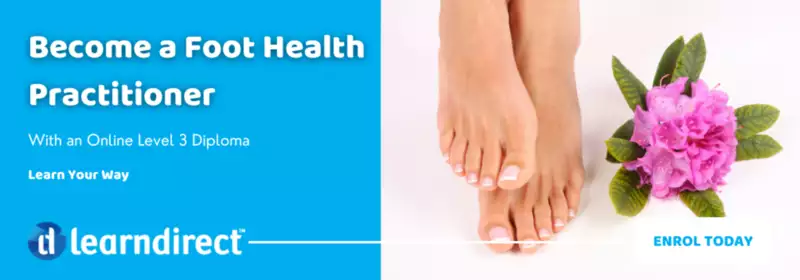Foot health care practitioners are one of the unsung heroes of the health profession. This is because most of us fail to realise just how important our feet are, until there's a problem.
Considering we rely on our feet almost every day of our lives, that is more than a little ridiculous. In the average lifetime we walk over 216 million steps. Which is roughly 110,000 miles. Or 5 times around the Earth.
Despite this demand on our feet many of us subject them to constant abuse with little or no after care. We wear shoes that are too big, or too tight. We rub blisters, develop corns and calluses and a range of other complaints.
Up to 42% of the adult population experience foot pain and in half of those cases it’s disabling. Meaning it prevents or inhibits mobility.
Foot pain can impair mood, change behaviour, increase the risk of falls, and reduces our overall quality of life.
Which is why foot health care practitioners perform such essential work. If you’re considering a career as a foot health care practitioner but you’re now sure where to start, read on.
.png)
What does a Foot Health Care Practitioner do?
In the broadest terms, a foot health care practitioner provides foot treatments and foot health advice to their patients.
They treat common foot health complaints such as bunions, corns and calluses. They can also perform basic health and hygiene for individuals unable to care for themselves. This can include cutting nails, removing hard skin and general foot hygiene.
You can also expect to treat veruccas, in-growing nails and helping to prevent pain when clients are moving around.
As the elderly are especially prone to these conditions, you can expect to work with this demographic. However, they will benefit massively from their feet being kept in good condition.
It is for this reason that working as a foot health care practitioner has a pastoral element to it. You need to be equal parts healthcare provider and friend.
You need to be able to make your patients feel safe in your hands, valued and listened to. In no small part because having a foot condition can be embarrassing.
Putting your patients at ease is often an essential part of the healing process. If they feel less self-conscious about their feet, they are more likely to take care of them.
You can support this process by teaching your patients how to properly care for their feet. While it can seem counterintuitive to teach preventative medicine to paying customers, it’s really not.
You will become a trusted ally. Your patients will come to you for more serious complaints, rather than issues relating to basic foot hygiene.
Indeed, a big part of your role can be monitoring circulation and limb health, this is especially important in diabetics. You will be required to work with GPs and hospitals, keeping them informed of any developments with patients.
In a very real sense, through caring for your patients’ feet you can spot a life-threatening condition when they are still treatable.
.png)
How to become a Foot Health Care Practitioner
Assuming the thought of handling bunions does not put you off before you can practice you have to get qualified.
There are many routes to becoming a foot health care practitioner. However, it’s important to know that you don’t need a medical background. A medical background wouldn’t hurt but it won’t impact on your chances of qualifying or getting a job.
A Foot Health Care Practitioner Level 3 Diploma is a great way of getting qualified and starting your foot health care career.
The course covers everything you need to know. You will learn about biological and physiological principles such as skin nutrition. You will learn about circulatory disorders, blood pressure and how these two factors are closely linked to complications stemming from diabetes.
You will be taught how to diagnose and treat a range of different conditions and administer the appropriate treatment. Or refer them to the appropriate medical professional.
Part of the course includes a 5-day practical in a state-of-the-art facility where you’ll be able to put your knowledge to the test.
During your practical sessions you will treat real patients under the supervision of qualified instructors.
This will allow you to hone your skills, build your confidence…and pick the brains of your instructors.
By the time you have completed the course you will have all the knowledge you need to treat patients safely and correctly.
Starting your Foot Health Care Practice
While you may opt to gain employment with an established practice or private medical centre, most qualified foot health care practitioners go it alone.
Part of the course covers how you go about setting up your own business.
This will include everything from how to register your practice to how to market yourself to your local community.
But of course, you need to pass the course first…
Learndirect is the UK’s leading online course provider. We can help you get qualified in no time. Thanks to our online learning portal, you can start your studies the same day you enrol with us.
You can work through the learning material as quickly as you feel comfortable to. Then, when you’re ready you can start your 5 day practical.
Upon completion of your course you will be awarded an RQF Level 3 Diploma in foot health care, which is a nationally recognised A Level equivalent.
You will gain membership to the Register of Foot Health Practitioners, allowing you to practice in the UK. To learn more about the course and enrol, click on the button below.
To learn more about distance learning, check out our blog.



















